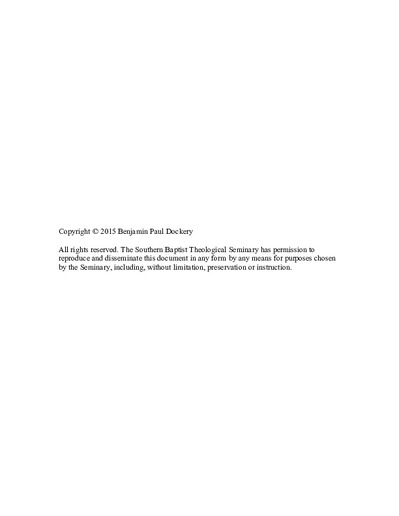| dc.description.abstract | ABSTRACT
AN ANALYSIS OF TED ENGSTROM’S PHILOSOPHY AND PRACTICE OF EXCELLENCE AND MENTORING
Benjamin Paul Dockery, Ph.D.
The Southern Baptist Theological Seminary, 2015 Chair: Dr. Michael S. Wilder
The research begins by raising questions surrounding a distinctively Christian approach to leadership. Specifically, this dissertation introduces the challenge of emphasizing both leadership excellence and leadership development in the life of a Christian leader. Next, Ted Engstrom is introduced as the key subject under analysis who provides a gateway into these leadership challenges. The thesis of the dissertation argues for the necessary wedding of these two leadership principles, excellence and mentoring, as evidenced in the life and writings of Engstrom and supported with biblical and theological argumentation.
In order to make this case, the research considers the six decades of Engstrom’s ministry in the context of American Evangelicalism, and, more specifically, demonstrates his influence at Zondervan Publishing, Youth for Christ, World Vision, and organizational consulting. Additionally, Engstrom’s written contribution to the areas of excellence and mentoring are framed within his broader contributions in the following fields: organizational leadership, time management, personal integrity, and board management.
Next, this dissertation outlines Engstrom’s understanding of excellence and builds out a supplemental account of excellence using biblical and theological support. Similarly, this dissertation provides an extended analysis of mentoring that starts with Engstrom’s account and extends to the biblical models and theological foundations. Before concluding, this research also argues that Engstrom is a leader worthy of imitation by summarizing personal interviews with those Engstrom formally and informally mentored. The conclusions supports an emphasis on excellence that requires mentoring while simultaneously holding to an emphasis on mentoring that demands excellence.
In conclusion, the argument interacts with recognized experts in the field of leadership to draw implications for Christian leaders in the twenty-first century. The hopeful outcome is a renewed equilibrium between excellence and mentoring as hallmark traits of Christian leadership. | en_US |

